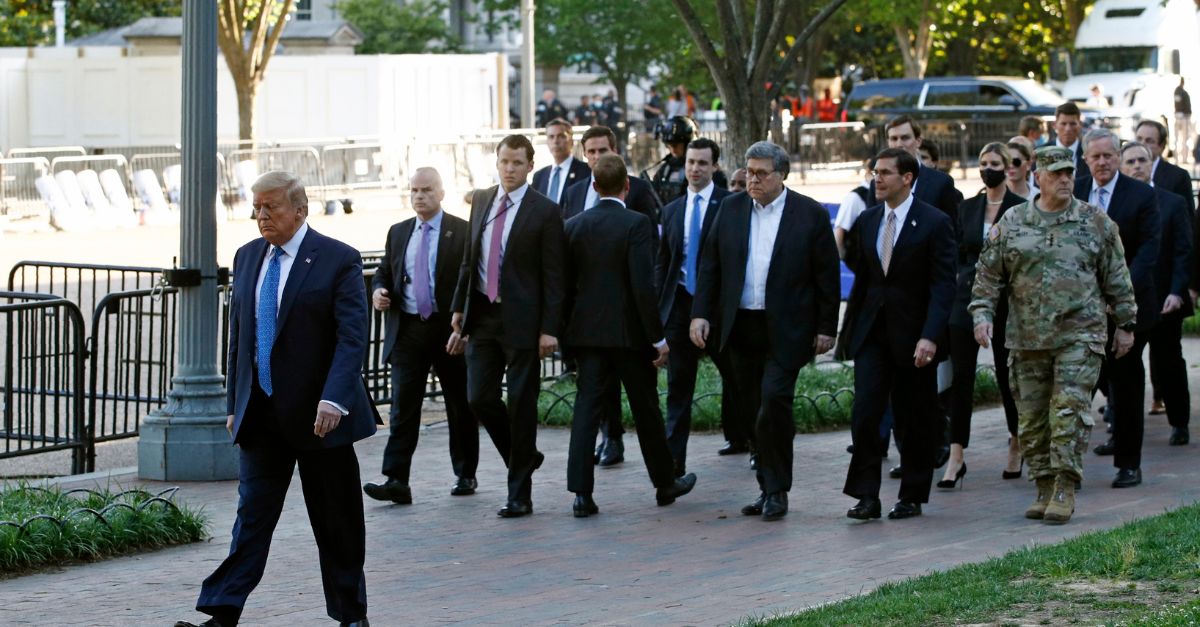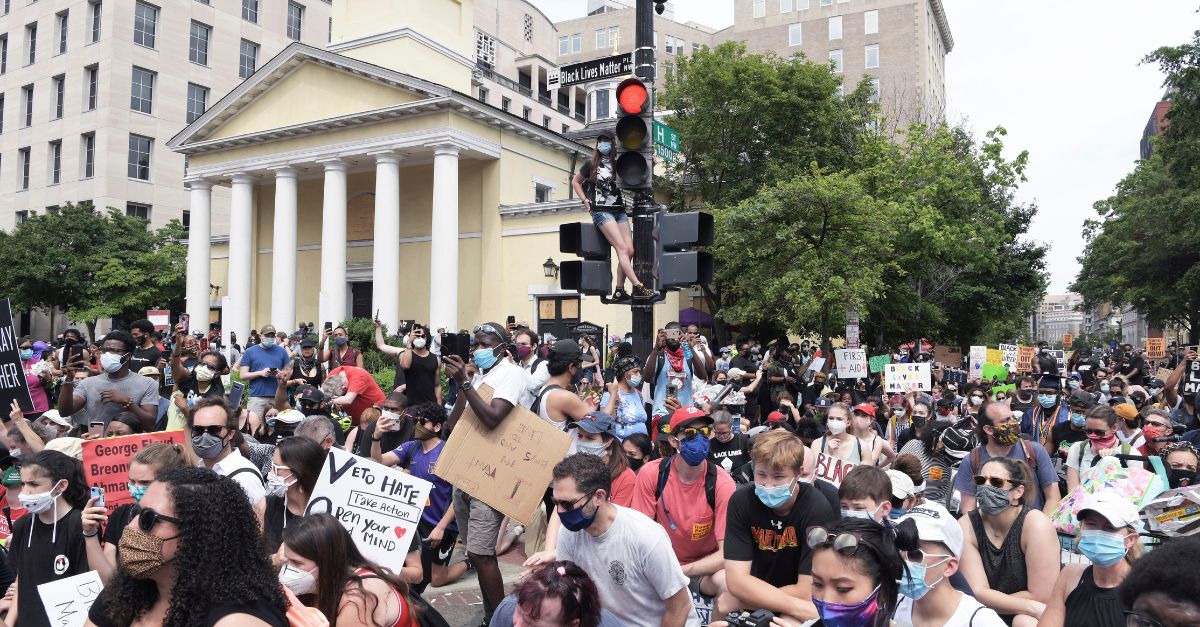
In this June 1, 2020, file photo, President Donald Trump walks in Lafayette Park to visit outside St. John’s Church across from the White House in Washington, D.C. (AP Photo/Patrick Semansky)
Ghosts from Donald Trump‘s presidential past are coming back to haunt him personally and in just a few short weeks, a case that could soon involve allegations of assault and battery and intentional infliction of emotional distress is poised to rear its ugly head.
The lawsuit in question is Buchanan v. Trump, a case that started in 2020 after protesters sued Trump in his official capacity and a number of other officials for unconstitutionally clearing them away from Lafayette Square Park that June by using chemical irritants including tear gas in as they peacefully protested the police killing of George Floyd. Trump famously walked through the park moments afterwards to visit a church and take a photo with a Bible.
The case has faced many twists and turns and has been litigated for years. Buchanan as well as another group of plaintiffs represented by the American Civil Liberties Union in a separate lawsuit, Black Lives Matter DC v. Trump, ended up settling with government after pitched litigation. With that settlement, new policies for protesters were achieved. But what remained were damage claims against Trump and other officials present at the square that day, like former Attorney General Bill Barr. Buchanan’s claims were ultimately thrown out due to restrictive laws protecting federal officials from civil lawsuits and they appealed. But they lost again on similar grounds.

Black Lives Matter activists protest against the police killing of George Floyd in front of St John’s Church in middle of the COVID-19 pandemic, on June 6, 2020, in Washington D.C., USA. (Photo by Lenin Nolly/Sipa USA)(Sipa via AP Images)
In January 2021, the U.S. Interior Department’s inspector general controversially reported that Lafayette Square was not cleared for Trump’s Bible photo opp though he appeared literal moments after police used devices like tear gas, flash-bangs, grenades, pepper balls, horses and batons to abruptly push protesters out of the area where he would soon stride through. The report found the use of pepper balls had been inconsistent with acceptable practices and also concluded it was unlikely protesters could hear police calls to leave as the scene devolved.
With that finding made and their lawsuits at a seeming standstill, the Buchanan plaintiffs had one avenue left: A new amended complaint approved by a judge.
And that is exactly what’s unfolded quietly in the background of Trump’s many other pressing legal dramas in recent weeks and months. Though the merits of the plaintiff’s amended claims have yet to be decided, a judge has granted the parties the right to serve Trump.
Lee Crain, a partner at Gibson Dunn, the firm representing the Buchanan plaintiffs, told Law&Crime in an email Friday:
We anticipate filing our claims against Mr. Trump by April 12, as the Court directed in granting our motion to amend in part. Our clients look forward to seeing Mr. Trump in Court and holding him accountable for his and others’ attacks on the rights of peaceful protesters in Lafayette Square.
According to a minute entry on the federal docket in Washington, D.C., on Thursday, a joint status report is now due on April 20. That will go toward the negotiation of deadlines for motions with Trump’s lawyers and it will determine whether Trump stays on the case. Its hard to imagine he would be able to divorce himself from it. Based on the original claims, the new lawsuit is expected to reflect similarly and pursue him in his personal capacity for the distress he caused. Whether he stays on as a named defendant, with his personal presence over Lafayette Square looming so large that June, it is likely he would be asked to testify in proceedings regardless.
Through his attorneys, Trump recently told civil litigant police and U.S. lawmakers suing him over the violence of Jan. 6 that if he was forced to face them in court, it would unfairly expose his defense strategy when he faces off agains special counsel Jack Smith in his impending election subversion trial.
Just about everywhere he has been indicted, Trump has clung to his blanket presidential immunity claim to stave off proceedings. But the pressing of that defense can only last for so long. As of Friday, there is less than a month until the Supreme Court meets to hear oral arguments on it.
Law&Crime takes a look at this and other developments in Trump’s cases in Florida, Georgia, Washington, D.C., and New York.
NEW YORK
CRIMINAL
Manhattan Supreme Court Justice Juan Merchan slapped Trump with a gag order this week, saying he was utterly unpersuaded that Trump would refrain from attacking witnesses, prosecutors and jurors. Trump responded by lashing out at the judge and the judge’s daughter on his social media platform, Truth Social.
Drawing attention to himself aside, “prejudicial media coverage” was the reason given by attorneys for the former president this week as they tried to adjourn proceedings in the hush-money and election interference case.
Poll questions put to respondents in Manhattan showed the prospective jury pool was oversaturated with bias against him, they claimed. It was the second attempt to adjourn his 34-count criminal indictment in March.
The trial is slated to begin with jury selection on April 15. The seemingly unending flurry of pretrial motions from Trump’s lawyers seemed to irk Merchan this week — he reminded the former president that a “court of record has power to punish for criminal contempt.”
CIVIL
Trump’s demand for a new defamation trial with writer E. Jean Carroll was met with a fierce reply from the veteran writer’s attorney Roberta Kaplan this week.
Not only is there no need for a new trial, she urged U.S. District Judge Lewis Kaplan, but given Trump’s “great difficulty” with refraining from making repeatedly defamatory comments about Carroll at the last trial, it seemed a “particularly acute” concern it would happen again if the judge permitted proceedings to go ahead. Trump, the attorney wrote, should not be able to “treat the court like a campaign event.”
And in separate civil matters: the collection of Trump’s $464 million civil fraud fine will be halted, a court agreed this week, but only if he can come up with $175 million to secure the order first. As of March 25, the court set a 10-day deadline.
GEORGIA
CRIMINAL
At a motions hearing Thursday, lawyers for the former president argued he was being unlawfully prosecuted and called for dismissal of the case. Fraud charges in the 41-criminal count indictment in Fulton County fail to hold up to legal scrutiny and were designed to penalize his political speech, they argued. That speech included his 2021 call to Georgia Secretary of State Brad Raffensperger where he asked him to “find 11,780 votes.”
Trump’s co-defendant Harrison Floyd, the onetime leader of Black Voices for Trump, scored a win this week when Fulton County Superior Judge Scott McAfee granted a certificate for immediate review on his claim that Fani Willis overstepped her authority by seeking an “election-related” indictment. Willis, meanwhile, fired off a letter to the chairman of the House Judiciary Committee Rep. Jim Jordan, R-Ohio, telling him: “[N]othing that you do will derail the efforts of my staff and I to bring the election interference prosecution to trial so that a jury of Fulton County citizens can determine the guilt or innocence of the defendants.” Jordan, a longtime Trump ally, has a habit of challenging prosecutors.
Trump on Friday officially filed his appeal against the ruling that left Willis on the case.
OF NOTE: Another one of Trump’s 19 co-defendants in the racketeering case, beleaguered lawyer Jeffrey Clark, had a trying week a bit further north in Washington, D.C., where he repeatedly invoked his Fifth Amendment right during a bar ethics hearing. Clark could be disbarred over his efforts to help Trump overturn the results of the 2020 election: One state bar court judge found that the Office of Chief Trial Counsel proved that John Eastman violated 10 of 11 attorney misconduct counts tied to his speech at the Ellipse on Jan. 6 and more.
FLORIDA
CRIMINAL
It’s déjà vu all over again in sunny Palm Beach where Trump told U.S. District Judge Aileen Cannon he needs to push back his Espionage Act trial indefinitely even as his lawyers argued earlier in the week that he shouldn’t face trial at all because of his right to “presidential immunity” and because, he contends, special counsel Jack Smith was unlawfully appointed.
The declaration was the latest example of Trump using one criminal case of his against another: his lawyers say the proposed trial dates in Florida for May and June won’t work now that the schedule has changed in his hush-money election interference case in New York. He rejected the suggestion by the judge and prosecutors in Manhattan that the reason for those delays were his own.
Meanwhile, special counsel Jack Smith asked Cannon to ignore a “deeply flawed” argument from Trump’s co-defendant and former valet Waltine Nauta that the case should be tossed on vindictive prosecution grounds. Nauta faces several charges including allegations that he conspired to obstruct, made false statements to the FBI and deleted Mar-a-Lago camera footage.
WASHINGTON, D.C.
CRIMINAL
With another week come and gone, the election subversion case remains quiet in Washington, D.C.
The Supreme Court hears the all-important immunity question on April 25.
OF NOTE: Lawmakers and police suing Donald Trump in civil court for his role in Jan. 6 told a judge this week that enough is enough and that the former president should not be able to dodge their lawsuits as he awaits a ruling from the U.S. Supreme Court on whether he is immune from prosecution. Trump has begged to pause the lawsuits, claiming if he was forced to face them, it could jeopardize his defense strategy at his yet unscheduled criminal trial for allegedly conspiring to overturn the results of the 2020 election, defraud the American people, obstruct proceedings and intimidate voters.
Have a tip we should know? [email protected]